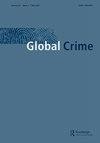将遭遇定为犯罪:联海稳定团作为武装人道主义安抚的实验室
IF 1.9
Q2 CRIMINOLOGY & PENOLOGY
引用次数: 13
摘要
摘要本文在“海地稳定联合国特派团”(联海稳定团)的背景下评估了军事化人道主义工作、治理和暴力之间的关系。它借鉴了在太子港和里约热内卢进行的实地考察。巴西在此次联合国任务中的领导作用强化了该国作为全球舞台上新兴经济和政治大国的雄心。巴西的军事和民事行为者声称,他们有独特的资格从事城市“安抚”工作,这是基于他们所声称的更深层次的文化敏感性,这种敏感性是在巴西城市犯罪边缘的日常军民冲突中发展起来的。通过分析军队、警察和公民就这些遭遇进行谈判的相互矛盾的叙述,我们认为,这些叙述可以揭示执行和平的有争议且往往是暴力的形式。本文章由计算机程序翻译,如有差异,请以英文原文为准。
Criminalising encounters: MINUSTAH as a laboratory for armed humanitarian pacification
ABSTRACT This article assesses the nexus of militarised humanitarian work, governance and violence in the context of the ‘Mission des Nations Unies pour la stabilisation en Haïti’ (MINUSTAH). It draws on empirical fieldwork in Port-au-Prince and Rio de Janeiro. Brazil’s leading role in this UN mission reinforces the country’s ambitions as an emergent economic and political power on a global stage. Brazilian military and civilian actors base their claim of being uniquely qualified for urban ‘pacification’ efforts on a supposedly deeper cultural sensitivity which they assert to have developed in everyday civil–military encounters in the criminalised peripheries of Brazilian cities. By analysing the conflicting narratives in which the military, police and citizens negotiate these encounters, we argue that they allow for a revealing of the contested and often violent forms in which peace enforcement occurs.
求助全文
通过发布文献求助,成功后即可免费获取论文全文。
去求助
来源期刊

Global Crime
CRIMINOLOGY & PENOLOGY-
CiteScore
3.90
自引率
4.50%
发文量
22
期刊介绍:
Global Crime is a social science journal devoted to the study of crime broadly conceived. Its focus is deliberately broad and multi-disciplinary and its first aim is to make the best scholarship on crime available to specialists and non-specialists alike. It endorses no particular orthodoxy and draws on authors from a variety of disciplines, including history, sociology, criminology, economics, political science, anthropology and area studies. The editors welcome contributions on any topic relating to crime, including organized criminality, its history, activities, relations with the state, its penetration of the economy and its perception in popular culture.
 求助内容:
求助内容: 应助结果提醒方式:
应助结果提醒方式:


